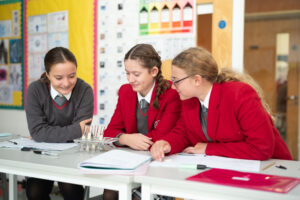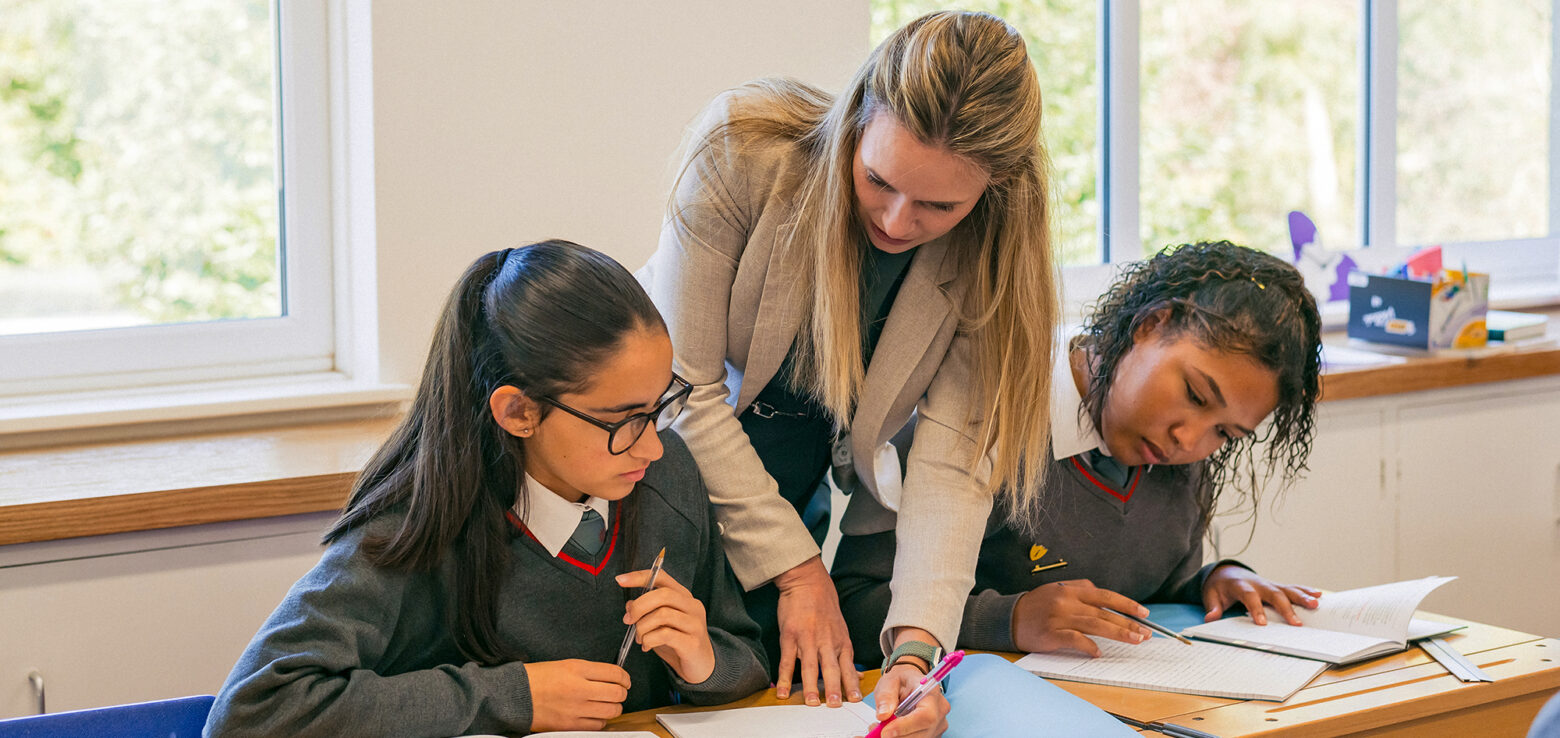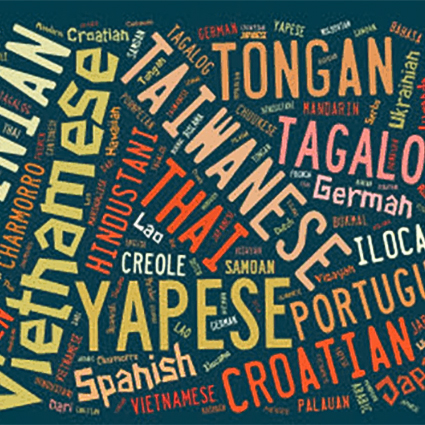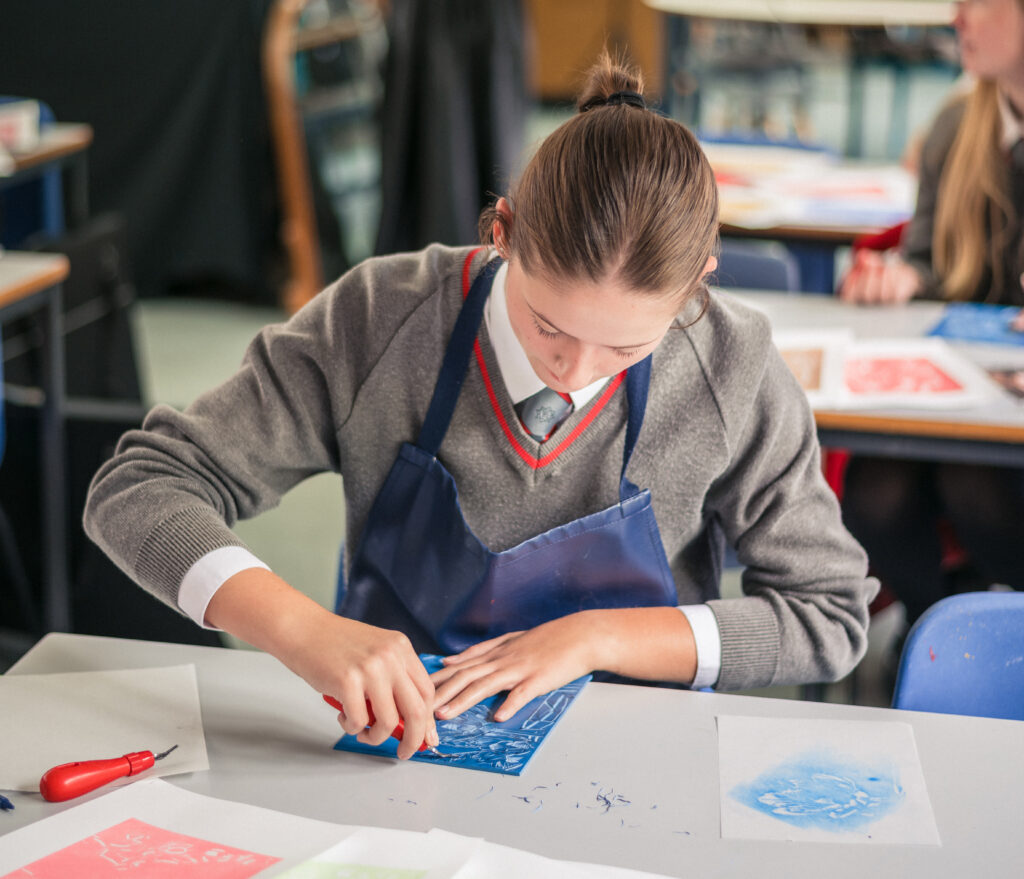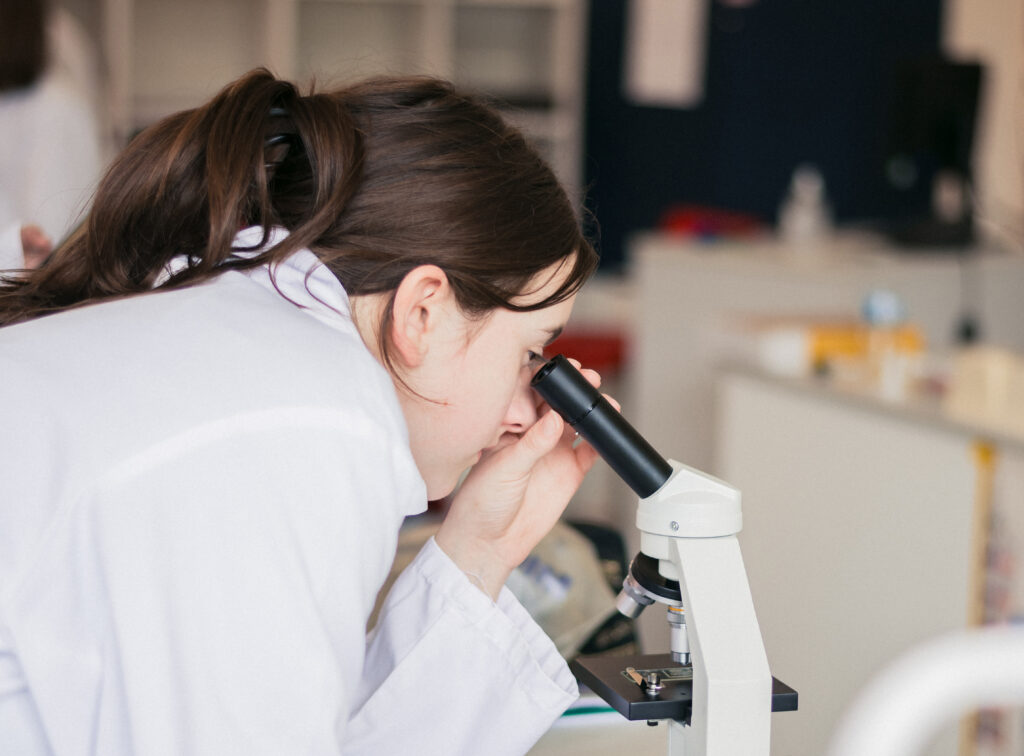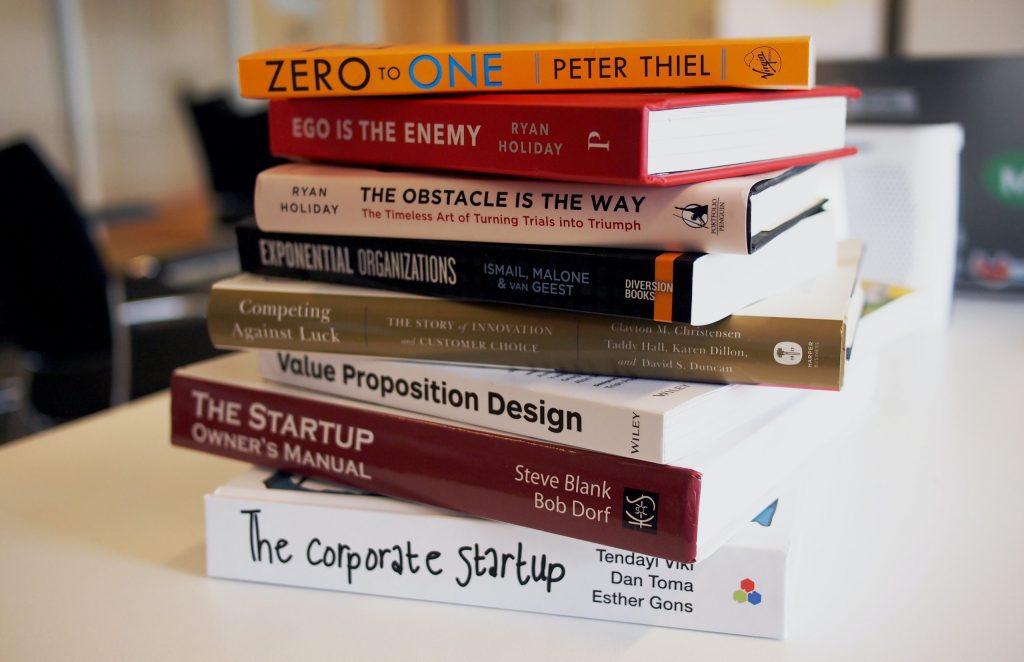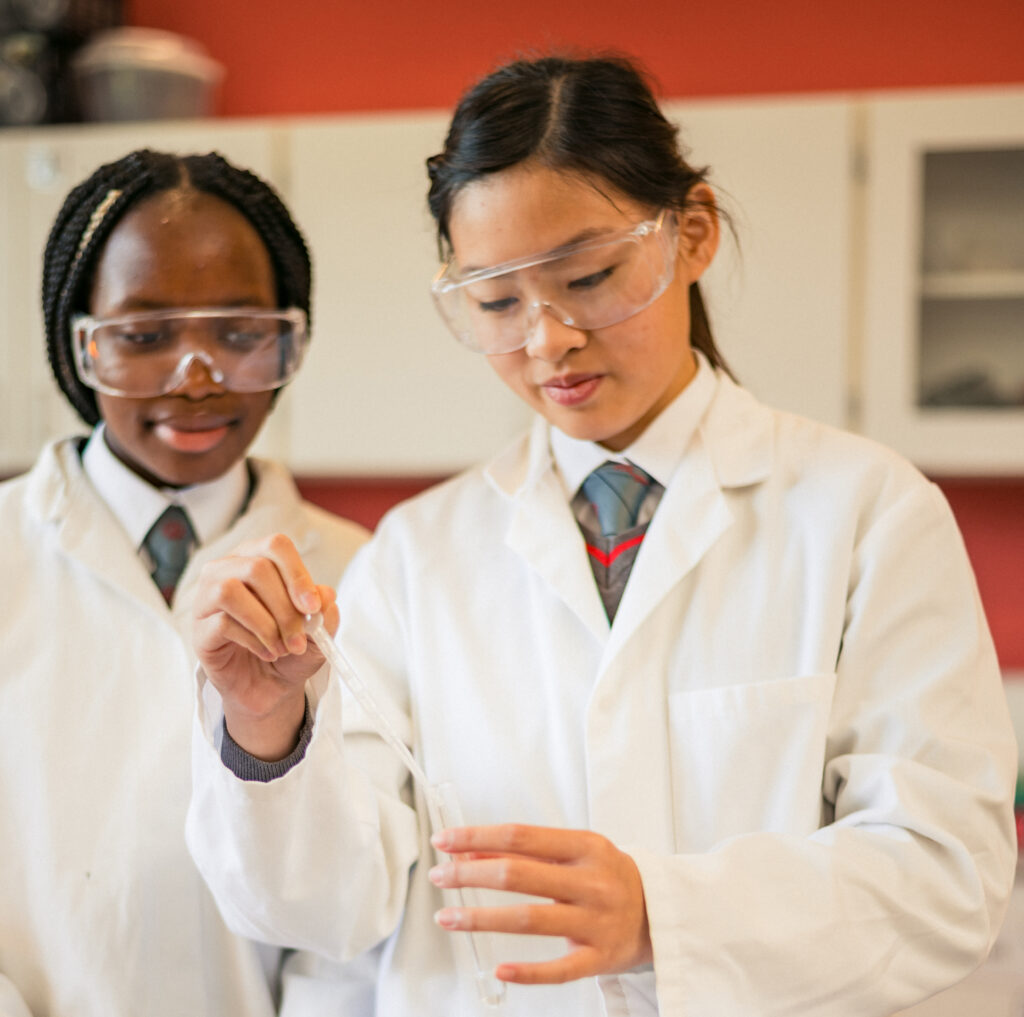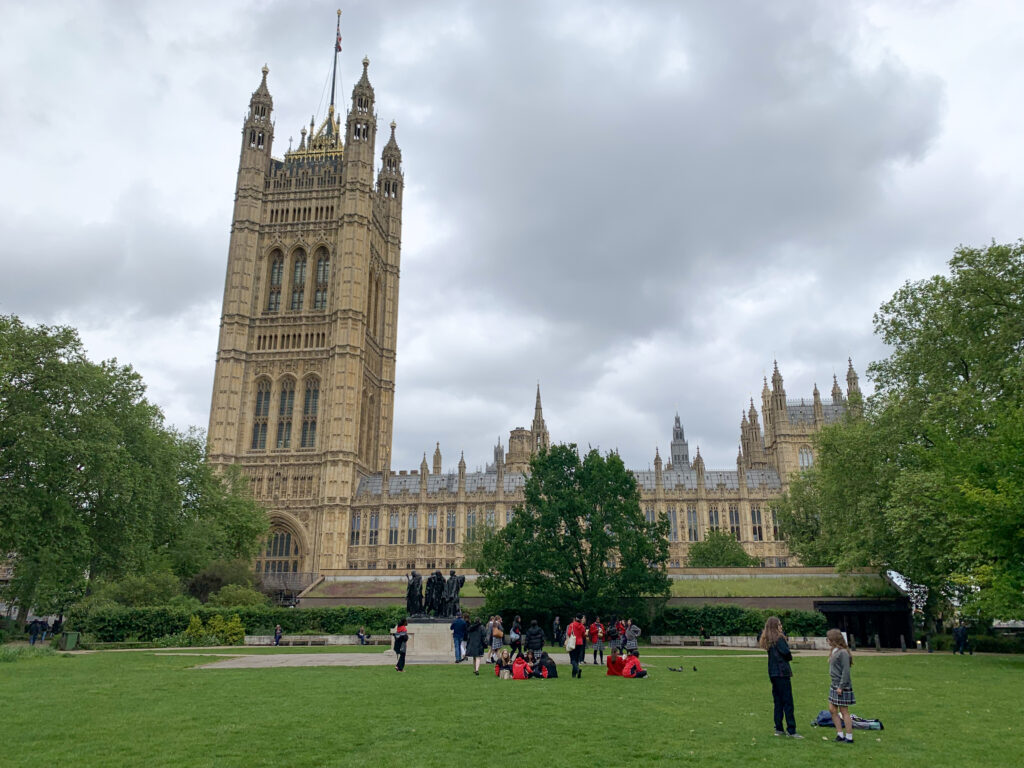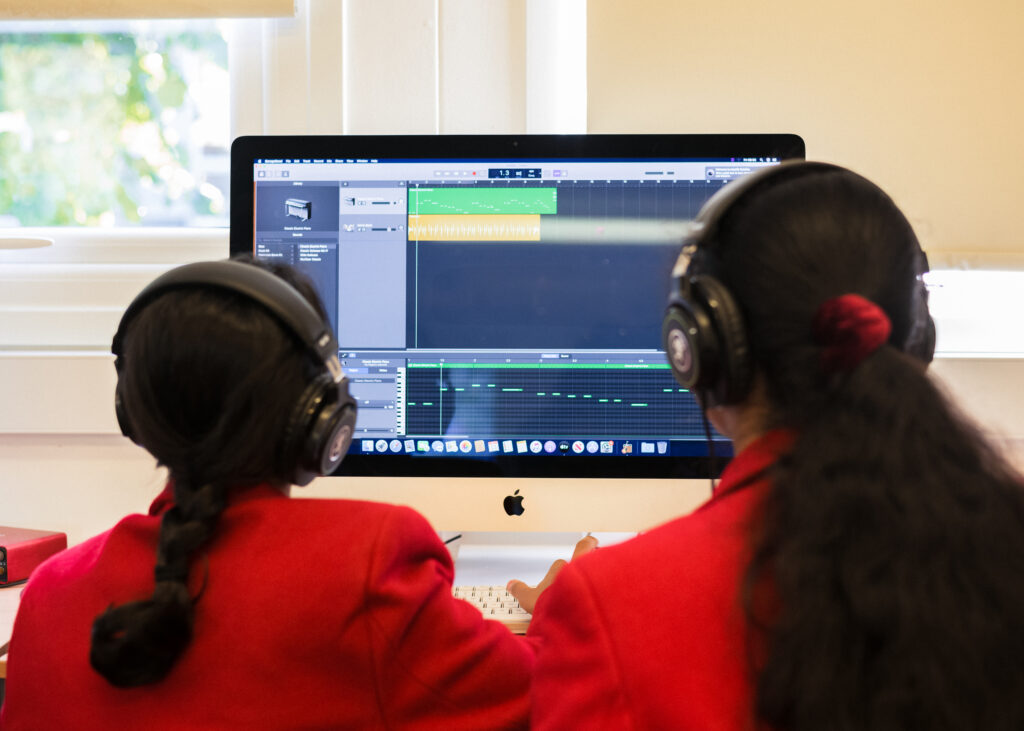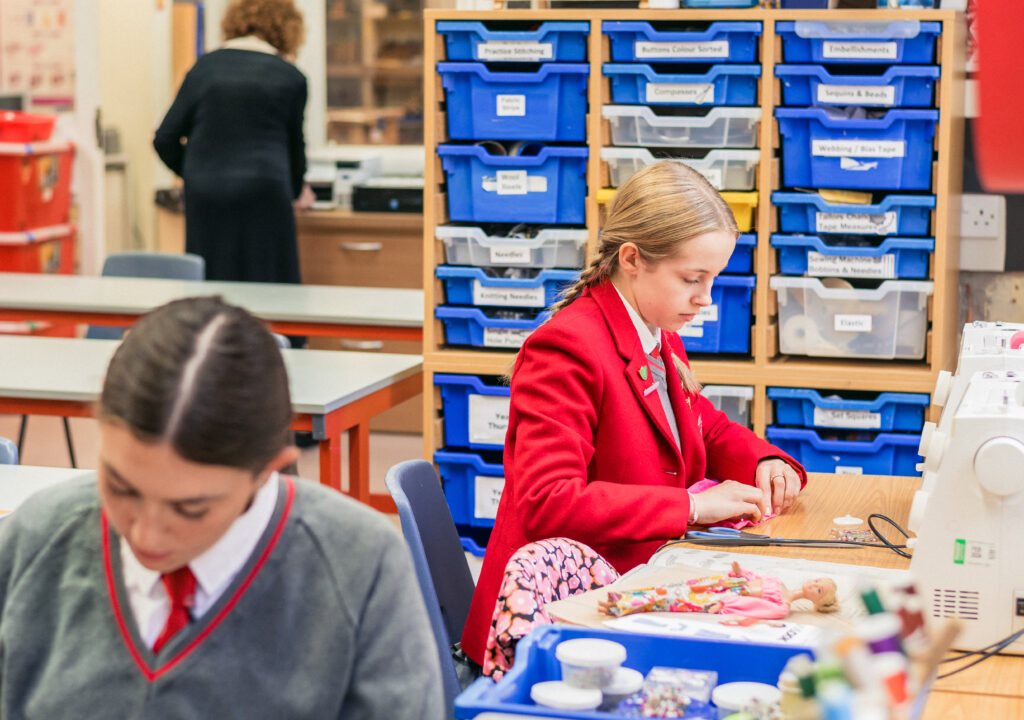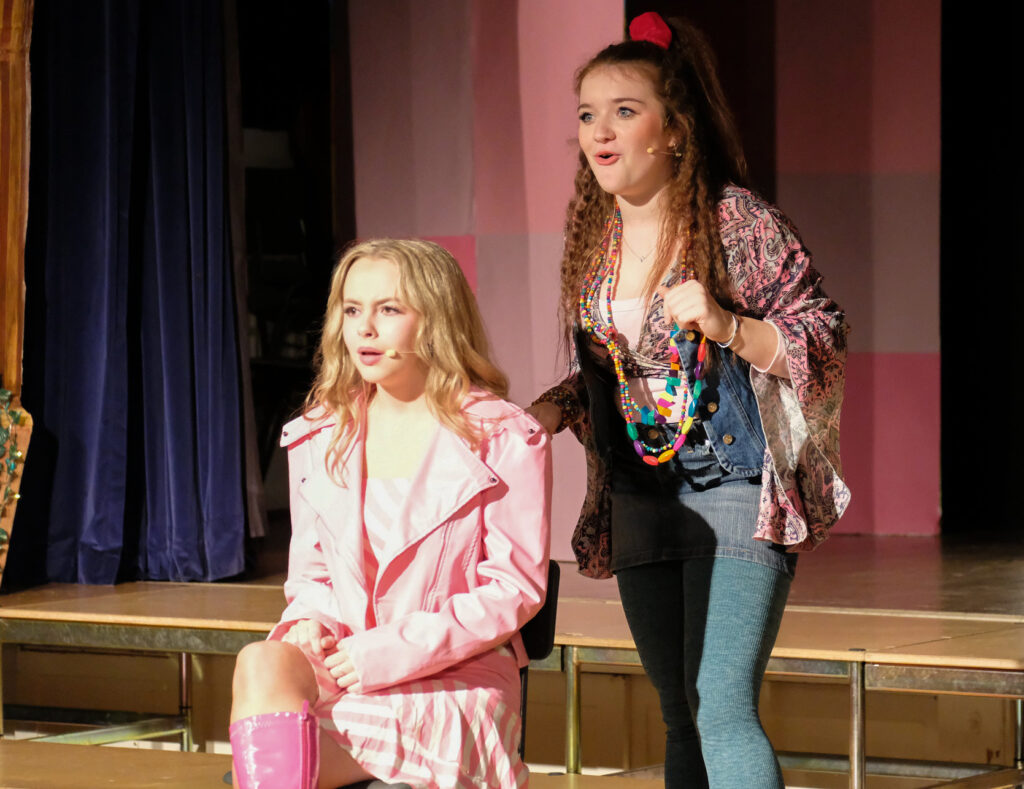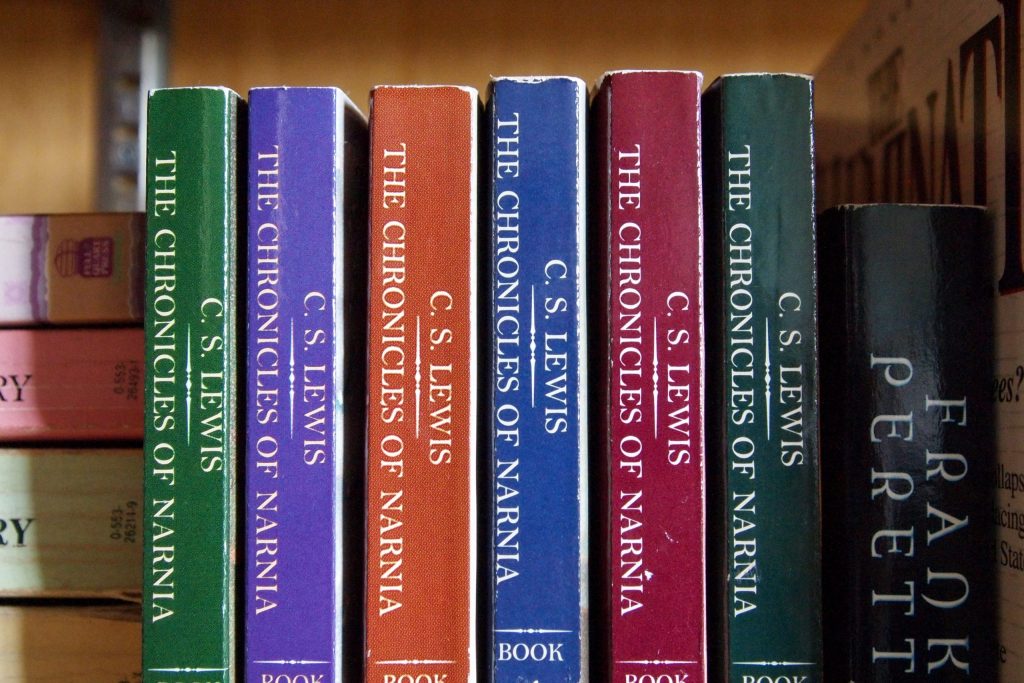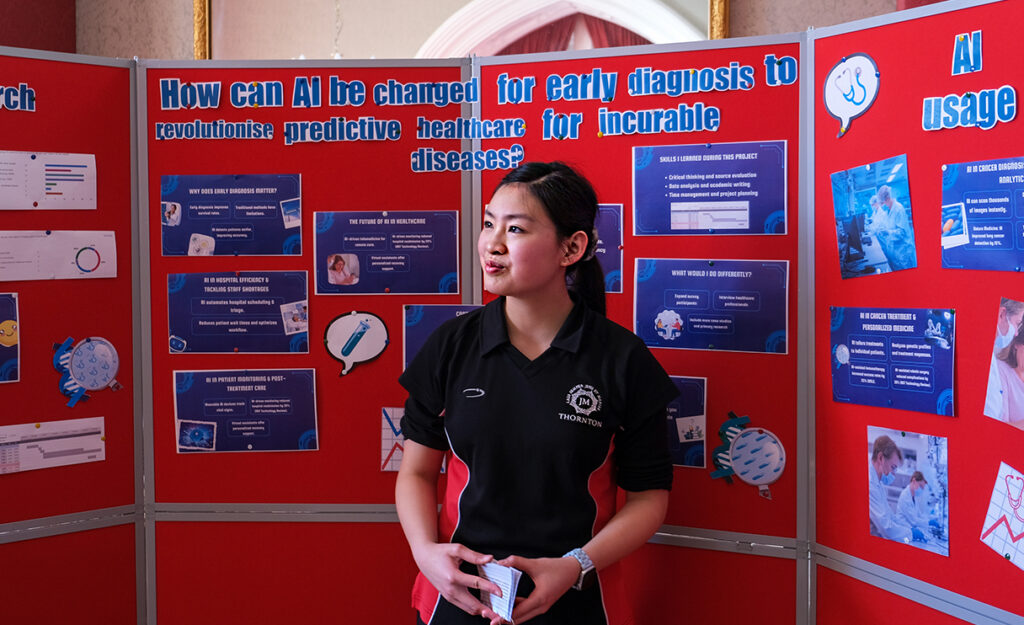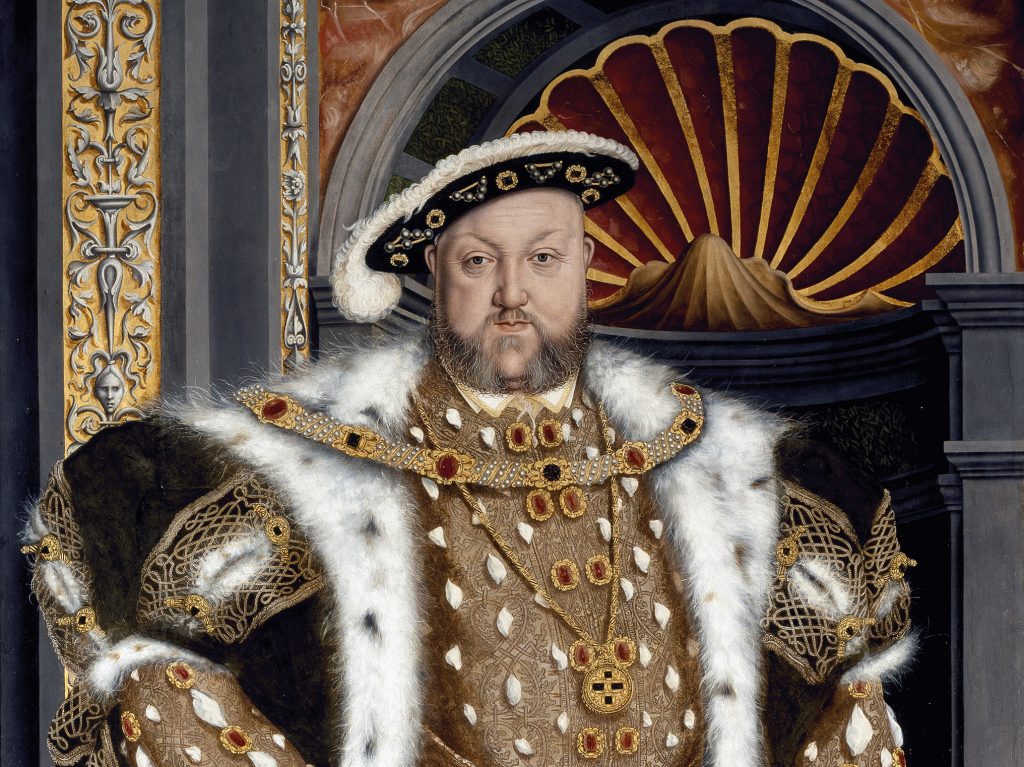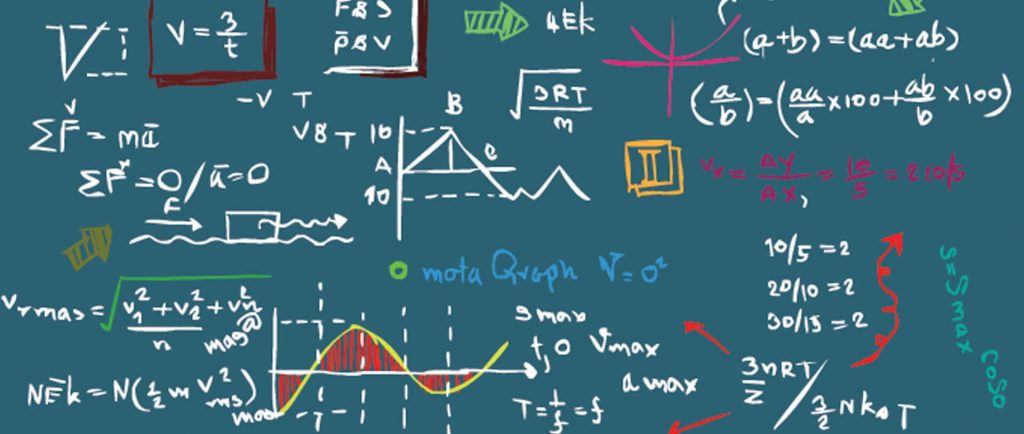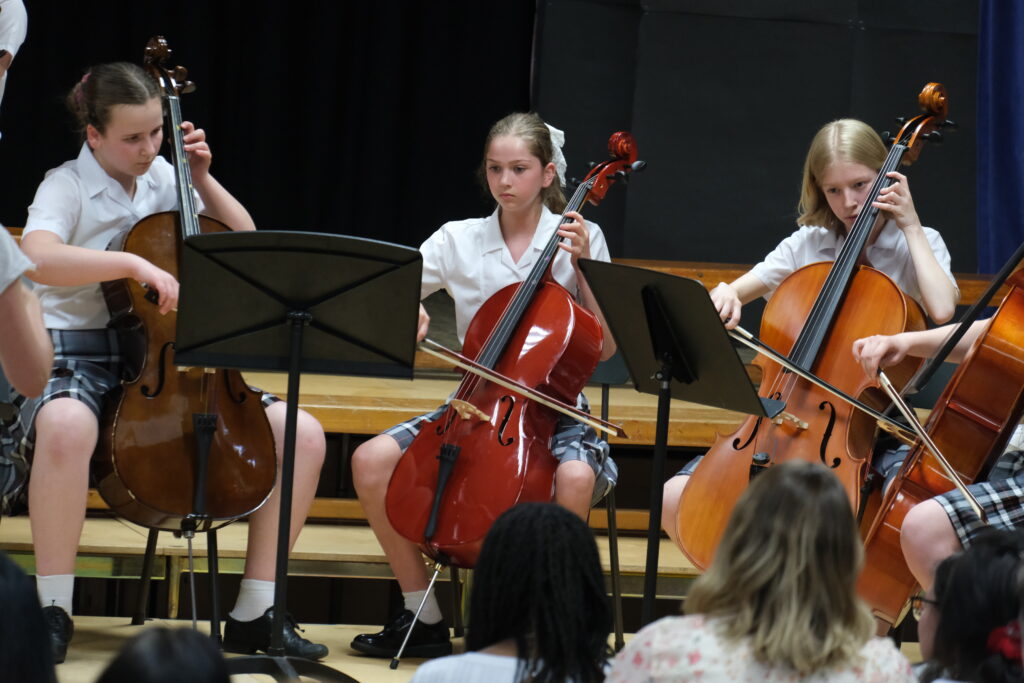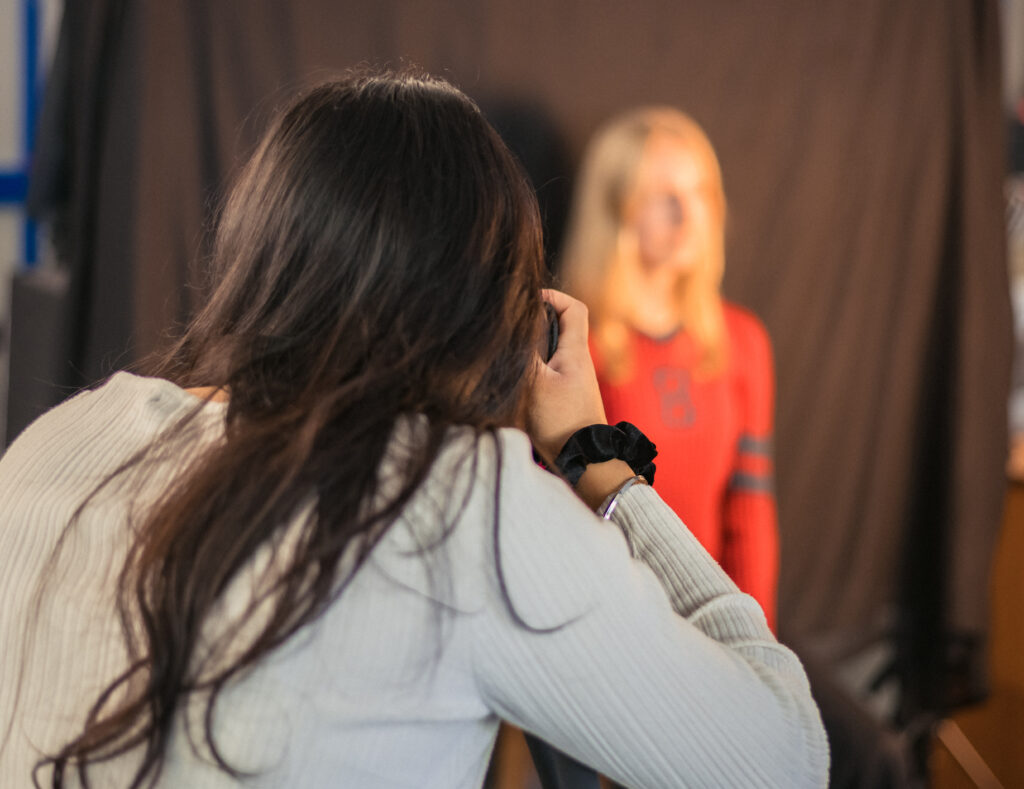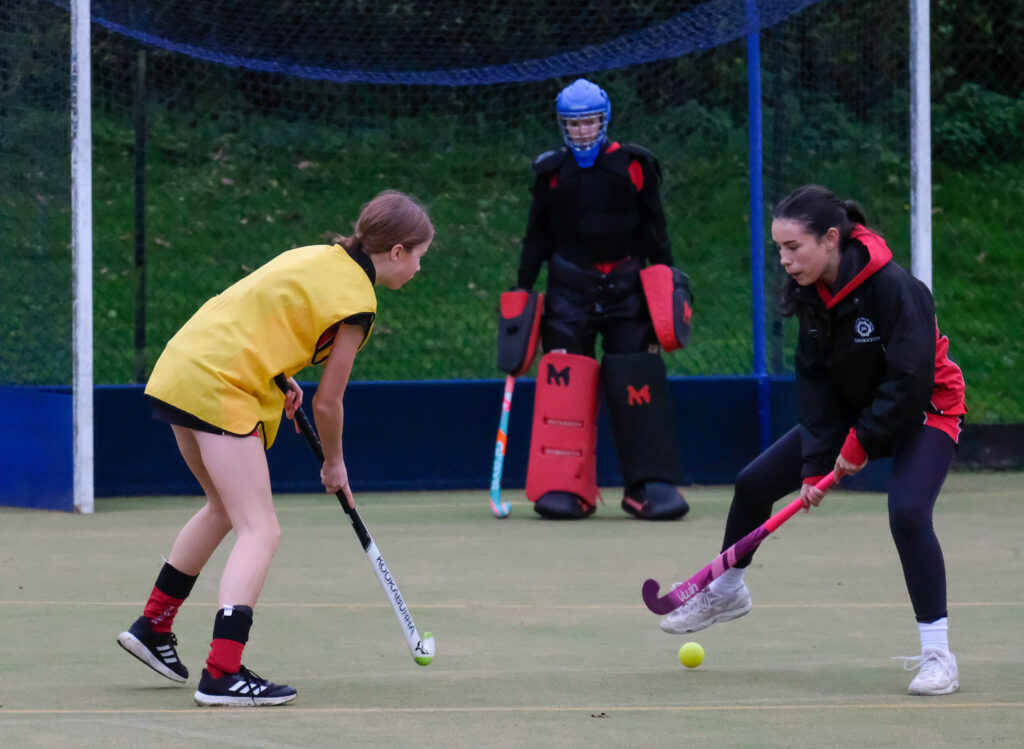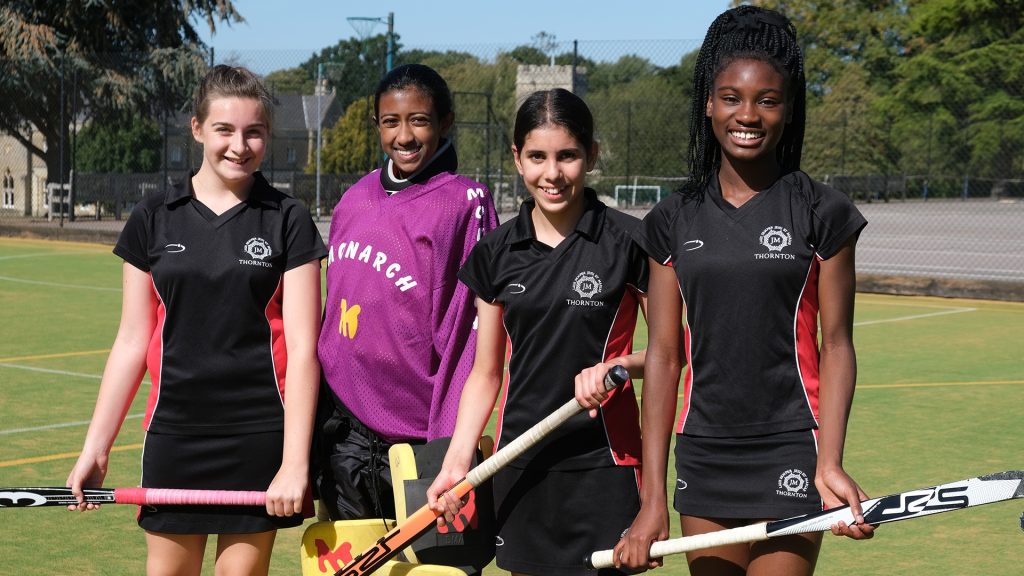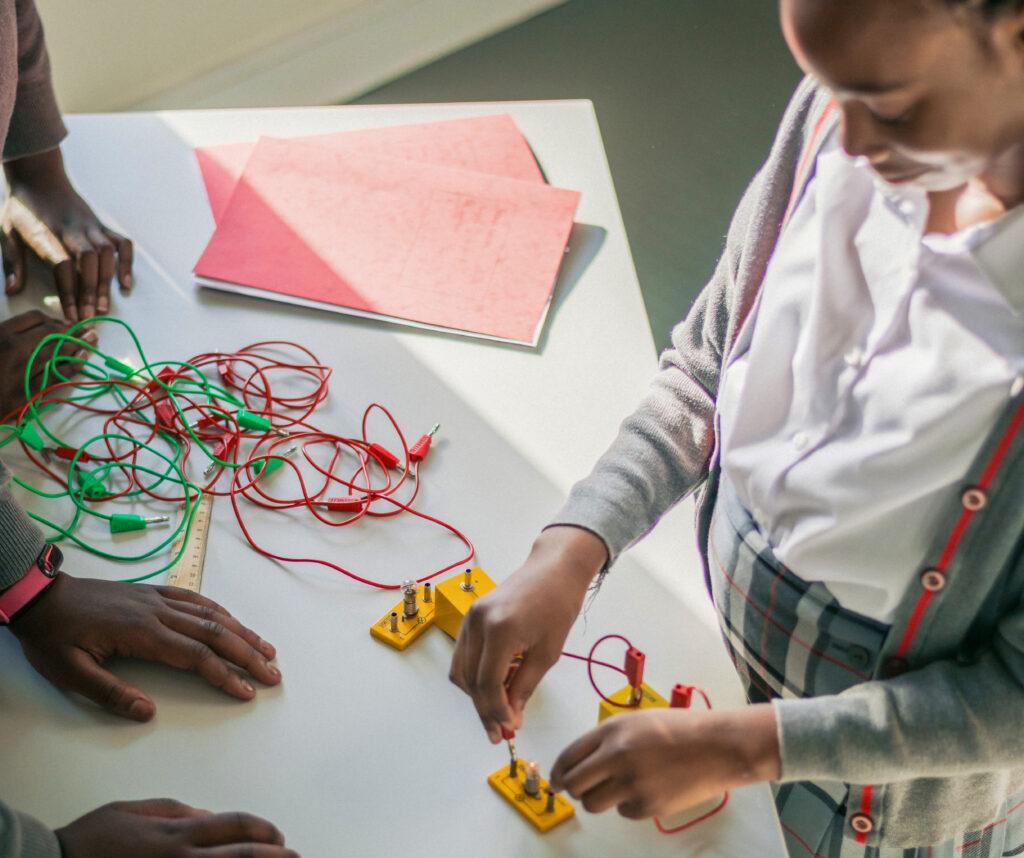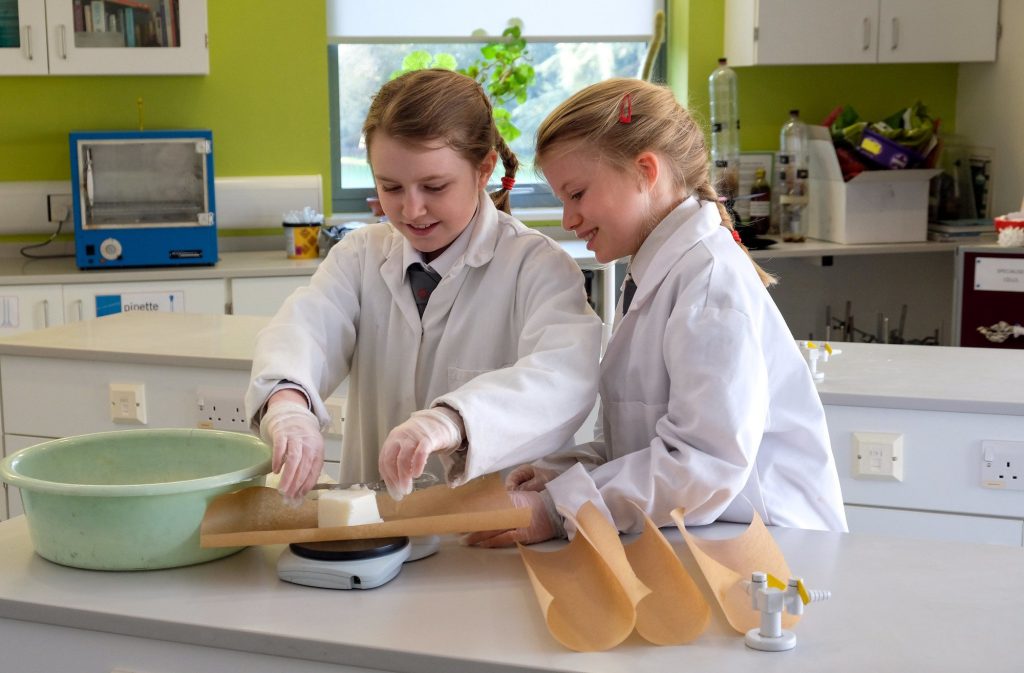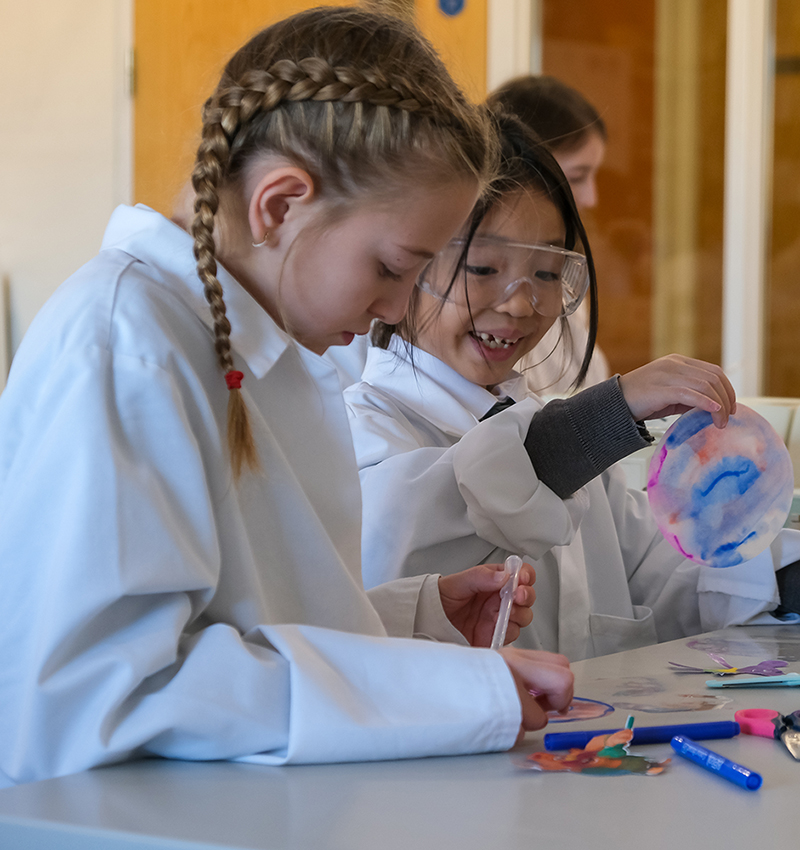GCSE Subjects
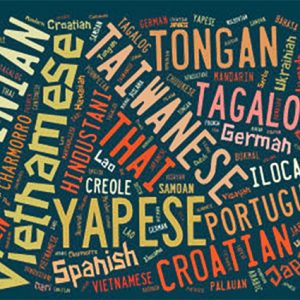
ADDITIONAL ENGLISH
ADDITIONAL ENGLISH
For students from overseas who require extra support in English, we offer a comprehensive EAL curriculum covering language development and preparation for Cambridge English exams.
Students who are entering Years 9 and 10 when they join Thornton will need a reasonable level of conversational English, but will be supported as they engage in their journey to complete fluency.
International parents can be confident that we will tailor our comprehensive curriculum to support their child’s individual academic and pastoral needs.
We prepare students for the Cambridge examinations at different levels, all regulated by the University of Cambridge ESOL department.
Students whose first language is not English will undertake an English Placement assessment on arrival at Thornton and be allocated to the appropriate Cambridge English level:
- Key English Test (KET) – level 1
- Preliminary English Test (PET) – level 2
- First Certificate in English (FCE) – level 3
- Cambridge Advanced English (CAE) – level 4
Every one of these certificates is recognised around the world by universities, employers, and government departments and, like a GCSE, is valid for life.
More information about these exams can be found at: www.cambridgeesol.org
KEY SKILLS AWARD
All students complete the Key Skills Award and this includes producing a portfolio of evidence to prove competence in wider key skills such as working with others, improving own learning and problem solving. The evidence is gathered through the completion of several challenges which can be selected from a wide choice and include personal hobbies and interests, subject-specific tasks and co-curricular activities. Students must also prove their ability to research independently, participate meaningfully and actively in a group discussion and give an oral presentation to an audience. Portfolios of work are internally moderated for the Certificate, usually in the Lent Term of Year 10. These are skills for the future world of work and as such are considered extremely important.
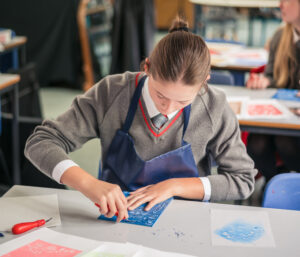
ART, CRAFT, DESIGN GCSE
Art, Craft & Design
EDEXCEL: 1ADO
At Thornton we are fortunate to have a broad selection of specialist resources to facilitate a wide range of media exploration. This pairs well with our ‘Art, Craft and Design’ specification, also designed to allow broad ranging experimentation. This not only allows students opportunity to enrich their learning, but also gives the best opportunity to achieve successful final grades.
We are passionate about tailoring each students’ GCSE experience to individual passions and skill sets. Thus once the fundamentals are taught, the student can evolve their portfolio in a wide variety of ways from traditional two dimensional media, right through to ceramics and even textiles techniques! We have a wide variety of equipment to suit all, and a course structure designed to allow a broad freedom of creative development.
As well as a wide range of traditional paint and print media, the department has a full size etching press, a professional heat press, a large capacity kiln, screen printing facilities, UV lighting equipment facilitating various traditional printing methods, eight sewing machines, Apple Mac computers, photo printers, a professional light box and an extensive range of hot- textiles equipment.
The course also provides the opportunity for students to explore both contemporary and historical sources of art, craft and design. Students will need to make visits to museums, galleries, art shows and fairs, both in and outside of school. Students are encouraged to develop an individual approach to their art, craft and design making. This flexible syllabus allows choice and independent learning.
The course is composed of two units:
Unit 1: Art and Design coursework portfolio (60%) Unit 2: Art and Design examination (40%)
Unit 1: Coursework Portfolio
Each student will have 3 hours a week to create a portfolio of coursework pieces to submit for their final assessment. They will be expected to match this in their private study time. This will consist of a body of thematic based work produced over the four term period. Classwork is supported by additional workshops held by visiting artists, teachers and co-curricular clubs. Students are expected to attend all additional sessions on offer as they play an important role in supporting and extending work for the coursework submission. Students will hold a final exhibition of their completed work in June of Year 11.
Unit 2: Externally Set Assignment
Each student will be issued with an examination paper at the beginning of January in Year 11 that includes a theme from which they must research and develop visual ideas. The studies produced will nurture the development of a final piece of work that is produced during a 10 hour examination which takes place over two consecutive days.
The key requirement for all endorsements is that students must submit evidence of drawing to support the development process in both coursework and the ESA (Externally Set Assignment).
Drawing can be applied in many ways across traditions and technologies. It can be critical and analytical as well as explorative and experimental, but it is essential to evidence recording from life, describing a mood or emotion and expressing atmosphere and tension, as well as, sketching down plans and outlines. Students must also be prepared to annotate their work and research the work of traditional and contemporary practitioners to validate their knowledge and understanding.
The course structure leads to a smooth progression to GCE Advanced level.
Courses will operate depending upon uptake.
For further details please contact the department.
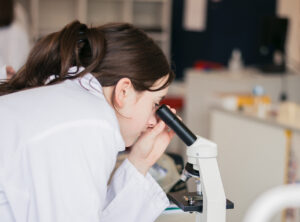
BIOLOGY
BIOLOGY
AQA: 8461
Specification:
The qualification is linear, so that the girls will sit all their exams at the end of the course.
Subject content
- Cell Biology
- Organisation
- Infection and response
- Bioenergetics
- Homeostasis and response
- Inheritance, variation and evolution
- Ecology
Assessments
There are two Biology papers, comprising of Multiple-choice, short answer and long response questions.
Each paper is 1hour 45minutes and the first paper will assess the content in sections 1-4, and the second will assess the content in sections 5-7.
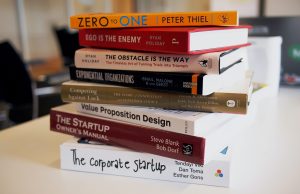
BUSINESS
BUSINESS
AQA: 8132
Business is not just one subject. It encompasses a wide variety of topics, all in the form of modules, ranging from marketing to finance. This means that we keep students completely engaged as they move from topic to topic – just as they would in the real business world! The course is up-to-date and relevant, reflecting the blend of business knowledge, practical skills, communication and team-working skills needed by anyone who is thinking about a career in any business-related job.
This course will enable students to understand:
- how businesses market their goods or services
- how businesses price their products effectively
- how outside factors influence a business, such as the state of the economy and the environment
- how businesses recruit and select the right people for work
- how businesses motivate their workforce
- to what extent businesses behave ethically
- how businesses are organised and make decisions
- how a business manages its finances
Paper 1: Influences of marketing and Human Resources on business activity
What is assessed
- Business in the real world
- Influences on business
- Business operations
- Human resources
How it is assessed
Written exam: 1 hour 45 minutes
90 marks – 50% of GCSE
Paper 2: Influences of marketing and finance on business activity
What is assessed
- Business in the real world
- Influences on business
- Marketing
- Finance
How it is assessed
Written exam: 1 hour 45 minutes
90 marks – 50% of GCSE
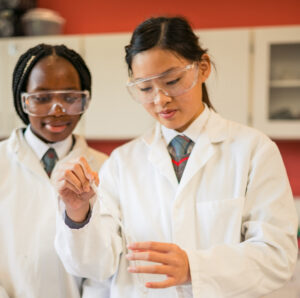
CHEMISTRY
CHEMISTRY
AQA: 8462
Specification:
The qualification is linear, so that the girls will sit all their exams at the end of the course.
Subject content
- Atomic structure and the periodic table
- Bonding, structure, and the properties of matter
- Quantitative Chemistry
- Chemical changes
- Energy changes
- The rate and extent of chemical change
- Organic Chemistry
- Chemical analysis
- Chemistry of the atmosphere
- Using resources
Assessments
There are two Chemistry papers, comprising of Multiple-choice, short answer and long response questions.
Each paper is 1hour 45minutes and the first paper will assess the content in sections 1-5, and the second will assess the content in sections 6-10.
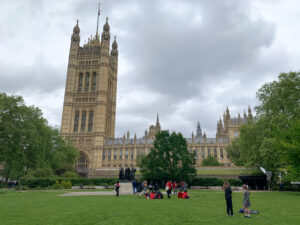
CITIZENSHIP STUDIES (POLITICS & CITIZENSHIP)
CITIZENSHIP STUDIES
Edexcel: 1CSO
Who should study for a GCSE in Citizenship, and why? The short answer is that everyone should — all members of society should have a better understanding of the general rules under which they live. For these rules to be effective, as many people as possible should actively participate in making them, upholding them and, maybe, changing them. This is what is meant by ‘active citizenship’. As an activity, politics is the process through which people with different ideas, values, opinions and interests attempt to find a way of living together within the same society. A healthy society is therefore one in which many people participate in political activity and do so with insight and understanding.
A GCSE in Citizenship Studies provides knowledge of the principles that underpin UK society, of how the UK’s political and legal system operates, and of how power and influence are exercised. GCSE Citizenship places a strong emphasis on debate, discussion and argument. It is therefore particularly likely to suit students who have an interest in the world around them, enjoy lively discussions, and like to think for themselves. Citizenship and politics qualifications are also highly valued by higher education institutions and employers.
The GCSE Citizenship Studies course content is divided into five themes:
Theme A: Living together in the UK
Key questions explored:
- How have communities developed in the UK?
- What is identity?
- What are democratic values and where do they come from?
- How does local democracy work?
Theme B: Democracy at work in the UK
Key questions explored:
- Who runs the country?
- How does Parliament work?
- How is power shared between Westminster and the devolved administrations?
- How does government manage public money?
Theme C: Law and justice
Key questions explored:
- What is the law for and how does it affect us?
- How does the justice system work?
- Is crime increasing in society?
Theme D: Power and influence
Key questions explored:
- What power and influence can citizens have?
- What role and influence should the media have?
- Does the UK have power and influence in the wider world?
Theme E: Taking Citizenship action
Working in a team of at least two people, students must carry out an in-depth, critical investigation leading to citizenship action.
Students are assessed in two exams of 1 hour 45 minutes each and will also need to carry out an active citizenship project of their own choosing.
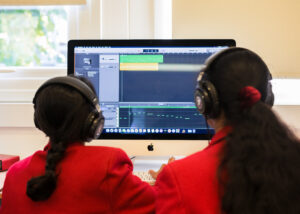
COMPUTER SCIENCE
COMPUTER SCIENCE
AQA: 8525
This specification has been created to get students working with real-world programming and provides a good understanding of the fundamental principles of computing. Students will complete this course equipped with the logical and computational skills necessary to succeed at A- level, the workplace or beyond.
This qualification is linear. Linear means that students will sit all their exams at the end of the course.
Subject content
- Fundamentals of algorithms
- Programming
- Fundamentals of data representation
- Computer systems
- Fundamentals of computer networks
- Cyber security
- Relational databases and structured query language
- (SQL)
- Ethical, legal and environmental impacts of digital technology on wider society, including issues of privacy
Paper 1: Computational thinking and programming skills
What’s assessed
Computational thinking, code tracing, problem-solving, programming concepts including the design of effective algorithms and the designing, writing, testing and refining of code.
How it’s assessed
Written exam: 2 hours
90 marks
50% of GCSE
Questions
A mix of multiple choice, short answer and longer answer questions assessing programming, practical problem-solving and computational thinking skills.
Paper 2: Computing concepts
What’s assessed
The content for this assessment will be drawn from subject content above.
How it’s assessed
Written exam: 1 hour 45 minutes
90 marks
50% of GCSE
Questions
A mix of multiple choice, short answer, longer answer and extended response questions assessing SQL programming skills and theoretical knowledge.
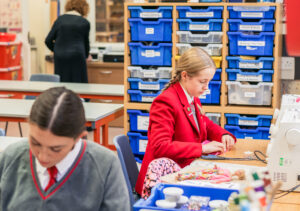
DESIGN & TECHNOLOGY
DESIGN & TECHNOLOGY
AQA: 8552
GCSE Design and Technology will prepare students to participate confidently and successfully in an increasingly technological world. Students will gain awareness and learn from wider influences on Design and Technology including historical, social, cultural, environmental, and economic factors. Students will get the opportunity to work creatively when designing and making and apply technical and practical expertise.
The GCSE allows students to study core technical and designing and making principles, including a broad range of design processes, materials techniques, and equipment. At Thornton our main material focus is Textiles and students have the opportunity to work with any one or combination of materials falling within this category. They will also have the opportunity to study specialist technical principles in greater depth.
Summary of aims and learning outcomes:
- develop an awareness and understanding of real-life experiences in design and manufacture
- demonstrate understanding that all design and technological activity takes place within contexts that influence the outcomes of design practice
- develop understanding of an iterative design process and the relevance of this to industry
- develop realistic design proposals created around
- users’/stakeholders’ needs, wants and values
- use imagination and experimentation and combine ideas when designing and critique and refine their own ideas whilst designing and making
- communicate their design ideas and decisions using different media and techniques, as appropriate for different audiences at key points in their designing
- develop a broad knowledge of materials, components and technologies to develop high quality, imaginative and functional prototypes
- be ambitious and open to explore and take design risks that stretch the development of design – avoiding clichéd or stereotypical responses
- consider the costs, commercial viability and marketing of products and demonstrate safe working practices in Design and Technology
Written paper – 2 hours 50% of GCSE
All students are required to demonstrate their knowledge of tools, materials and processes and the mathematical skills and scientific knowledge as applied to Design and Technology practice.
Coursework Iterative Design Challenge Approximately 40 hours – Non-exam assessment – 50% of GCSE
The Iterative Design Challenge takes the form of a portfolio of evidence and a final prototype. Students have the opportunity to demonstrate their knowledge, understanding and skills over time in order to realise a valid outcome that reflects real-world design considerations.
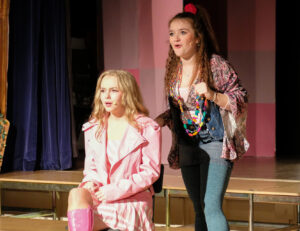
DRAMA
DRAMA
Educas
The Drama GCSE course offers students the opportunity to work in an exciting and stimulating environment, working very closely with their peers to produce challenging pieces. Students are actively encouraged to experiment and learn through making mistakes, in a safe space. This ambitious course will develop students’ vocal and physical skills, as well as teaching them high level characterisation techniques and ways of engaging their audiences. The workshop-style lessons and students’ sense of ownership over their performances not only develops independence, but also gives the students a taste of rehearsal processes well beyond GCSE level.
Keeping a journal throughout the course allows the students to record their discoveries, revelations and progress. This will inform the written elements of the course, as well as helping the students to progress their practical skills, learning from that which has not gone to plan.
Throughout the course, students will not only develop their acting skills, but also cultivate an in-depth knowledge of various theatre practitioners and genres of theatre, focusing on Stanislavski, Brecht and Physical Theatre.
Students will design sets, costumes and props, as well as forming an appreciation and understanding of sound and lighting design. There is also the option to work as a designer for the practical projects, rather than an actor, if students find they have a passion for one of the design elements.
They will have the opportunity to visit the theatre on multiple occasions, broadening their perceptions of what theatre is and accessing professional work.
There is a requirement to attend one extra rehearsal session each week. The day and time of this will be decided, based on the students’ availability. It is recommended that GCSE Drama students also attend Senior Drama club, but this is not compulsory.
Component 1 – Devising Theatre – 40% of qualification
Internally assessed, externally moderated.
Students can be assessed on either acting or design. Students will participate in the creation, development and performance of a piece of devised theatre. This means that the students write and create the piece themselves in response to their chosen stimulus. The stimuli will be set by the exam board and could be anything from a painting, to a song, to simply a quote.
They will use either the techniques of an influential theatre practitioner or a genre to create a clear style for this piece.
Students must produce:
A performance of their piece of devised theatre
A portfolio of supporting evidence (which can include a vlog, sketches/diagrams and photographs, as well as writing)
An evaluation of the final performance or design
Component 2 – Performing from a Text – 20% of qualification
Externally assessed by a visiting examiner. Students can be assessed on either acting or design.
Students will study two extracts from the same performance text. They will participate in one performance, using sections of text from both extracts, to create one coherent piece.
Component 3 – Interpreting Theatre – 40% of qualification
Written examination: 1 hour 30 minutes
Section A: Set Text – A series of questions on one set text from a choice of five:
The Tempest, William Shakespeare
The Caucasian Chalk Circle, Bertolt Brecht
Hard to Swallow, Mark Wheeller
War Horse, Michael Morpurgo, adapted by Nick Stafford
DNA, Dennis Kelly
Section B: Live Theatre Review – One question, from a choice of two, requiring analysis and evaluation of a given aspect of a live theatre production seen during the course.
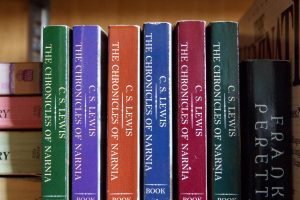
ENGLISH LANGUAGE (CORE)
ENGLISH LANGUAGE (CORE)
Edexcel: 1ENO
English is invaluable for everyone’s future – no matter what they decide to do. A good command of the spoken and written word will help every day – and benefit other GCSEs too.
From Anthropology to Zoology, GCSE English Language will
help students to:
- Think independently
- Be creative
- Think critically
- Communicate ideas with confidence
- Think logically
English Language will allow students to demonstrate the use of English in real life, investigate how language is used and draw on their own experience.
The aims and objectives of this two-year English Language course are to enable students to:
- read a wide range of texts fluently and with good understanding
- read critically and use knowledge gained from wide reading to inform and improve their own writing
- write effectively and coherently using Standard English appropriately
- use grammar correctly, punctuate and spell accurately
- acquire and apply a wide vocabulary alongside knowledge and understanding of grammatical terminology, and linguistic conventions for reading, writing and spoken language
- listen to and understand spoken language, and use spoken Standard English effectively
This is a linear, two-year course, with one single tier of entry; it consists of two components, which are assessed by two externally set and marked examination papers, and one endorsement for Spoken Language.
Component 1: Fiction and Imaginative Writing
Students will study selections from a range of prose fiction and develop skills to analyse and evaluate 19th-century fiction extracts. They will also develop and extend their imaginative writing skills in order to engage the reader, and will need to use spelling, punctuation and grammar accurately.
Paper 1 (1¾ hours) will assess 40% of the total English Language qualification and is divided into Reading and Writing sections.
Section A (1 hour): Reading – questions on an unseen 19th-century fiction extract.
Section B (45 mins): Writing – a choice of two writing tasks which are linked by theme to the reading extract.
The total number of marks available is 64.
Component 2: Non-Fiction and Transactional Writing
Students will study a range of 20th and 21st-century non- fiction texts, including literary non-fiction, and develop skills to analyse, evaluate and compare non-fiction extracts. They will also develop transactional writing* skills for a variety of forms, purposes and audiences and will need to use spelling, punctuation and grammar accurately. [*writing accurately and effectively for different purposes and audiences; writing to inform, argue, persuade, advise, explain etc ].
Paper 2 (2 hours 5 minutes) will assess 60% of the total English Language qualification and is divided into Reading and Writing sections.
Section A (1 hour 20 minutes): Reading – questions on two thematically linked, unseen non-fiction extracts.
Section B (45 mins): Writing – a choice of two writing tasks which are linked by theme to the reading extracts.
The total number of marks available is 96.
Assessment of Spoken Language
The preparation and assessment of spoken language is a compulsory requirement of the course of study.
Performance will be assessed against common assessment criteria issued by the examination boards.
The criteria will address the following assessment objectives:
A07: Demonstrate presentation skills in a formal setting.
A08: Listen and respond appropriately to spoken language, including questions and feedback to presentations.
A09: Use spoken Standard English effectively in speeches and presentations.

ENGLISH LITERATURE (CORE)
ENGLISH LITERATURE (CORE)
Edexcel: 1ENO
The aims and objectives of this two-year English Literature course are to enable students to:
- read a wide range of classic literature fluently, and with good understanding, and make connections across their reading
- read in depth, critically and evaluatively, so that they are able to discuss and explain their understanding and ideas
- develop the habit of reading widely and often
- appreciate the depth and power of the English literary heritage
- write accurately, effectively and analytically about their reading, using Standard English acquire and use a wide vocabulary, including grammatical terminology, and other literary and linguistic terms they need to criticise and analyse what they read
Component 1: Shakespeare and Post -1914 Literature
Students will study a Shakespeare play (Macbeth) and a post-1914 British play or novel (An Inspector Calls) and develop skills to analyse how the language, form, structure and context of texts can create meanings and effects. They will also develop skills to maintain a critical style and informed personal response;
Paper 1 (1hour 45 minutes) will assess 50% of the total
English Literature qualification and is divided into two
sections. This is a closed book examination (texts are not allowed in the examination).
Section A (55 minutes): Shakespeare – a two-part question, with the first task focused on an extract of approximately 30 lines. The second task is focused on how a theme reflected in the extract is explored elsewhere in the play.
Section B (50 minutes): Play or Novel – a choice of two essay tasks [includes up to 8 marks for VSPAG –vocabulary, spelling, punctuation and grammar]. The total number of marks available is 80.
Component 2: 19th-Century Novel and Poetry since 1789
Students will study a 19th-century novel (Dr Jekyll & Mr Hyde) and a collection of 15 poems from the Pearson Poetry Anthology and develop skills to analyse how the language, form, structure and context of texts can create meanings and effects. They will also develop skills to maintain a critical style and informed personal response, as well as develop their comparison skills.
Paper 2 (2 hours 15 minutes) will assess 50% of the total English Literature qualification and is divided into two sections. This is a closed book examination (texts are not allowed in the examination).
Section A (55 minutes): 19th-Century Novel – a two-part question, with the first task focused on an extract of approximately 400 words. The second task is an essay question exploring the whole text.
Section B (80 minutes): Poetry
Part 1 (35 minutes): one question comparing a named poem from the anthology to another poem from the collection. The named poem will be shown on the question paper.
Part 2 (45 minutes): one question comparing two unseen contemporary poems.
The total number of marks available is 80.

FRENCH
FRENCH
Edexcel: 2FR01
Why study Modern Languages?
- Languages broaden horizons and open up a whole new world of possibilities and opportunities.
- There are over 5000 degree courses in the UK which involve the study of languages. Students can study languages combined with hundreds of other subjects such as Law, Economics, Engineering, History, Finance, Media, Broadcasting, Biology etc
- Learning languages helps an individual to become a more confident communicator
- Experimenting with new words and phrases is both fun and challenging
- Whether or not there is the intention to specialise in this area, knowledge of one or more languages:
- Enhances job prospects – almost all jobs can be enhanced by the ability to speak a different language
- Helps university application – universities are looking for students with a wide range of transferable skills
- Makes it possible to study abroad in a non- English speaking country without the exorbitant university fees – it is possible to study Geography in France!
- More and more universities also offer a year abroad as part of non-language degrees
- Helps if a student plans to travel the world either in a gap year or later
If a student speaks a language at home which is not taught as part of our curriculum, we will try to make it possible for her to take exams in the language here if she so wishes.
How is the GCSE course in French organised?
- Identity and Culture
- Me, my family and friends
- Relationships and family activities
- Friendships and social groups
- Youth culture, leisure activities and use oftechnology
- Typical lifestyles, daily routines and activities, food and holidays
- Local, national, international and global areas of interest
- Festivals, traditions, memorable events, sporting events
- Charity related activities, fair trade, food miles, global poverty, fundraising
- Key features and activities of a town or region
- Current and future study and employment
- School subjects
- School life
- Future plans
Students have already studied aspects of these in their language lessons. They will continue to use a course book and will have some lessons in the computer room using exciting software.
How is it assessed?
There is no coursework; all of the exams are at the end of the two year period. Speaking exams will be conducted by the teacher towards the end of the course, and then be sent away for marking.

GEOGRAPHY
GEOGRAPHY
AQA: 8035
Why study Geography?
Students enjoy the scope of the material they cover in Geography, the insights it can provide into understanding the world around us and the sheer contemporary nature of the issues it tackles. Key elements in the study of any subject are understanding and skills.
Is Geography a good choice in terms of getting a job?
The skills used in geographical studies makes students of potential interest to a wide range of employers. The close link between the subject and the world around us makes for a long and varied list of related careers. For example, working with development or aid agencies, environmental work, using Geographical Information Systems, working for the census office and in tourism and recreation.
What are the advantages of studying Geography?
Geographers are taught a wide-ranging combination of skills drawing in ideas from many sources. This ability to view issues from a wider perspective is appropriate for working in many different areas. The nature of peoples’ working lives is changing. It is less likely that someone will spend all their life in one company or organisation (the so-called job for life). If a student’s career path is to be varied she will need to develop transferable skills and be flexible. Geography fosters these qualities and provides a firm base for life-long learning.
Subject content:
Living with the Physical Environment (35% of GCSE)
Exam: 1 hour 30 minutes
Challenge of Natural Hazards
Tectonic hazards, tropical storms, extreme weather in the UK, climate change.
- The Living World
Local ecosystems, tropical rainforests, one from hot deserts or cold environments.
Physical Landscapes in the UK
Two from coastal, river, glacial or landscapes.
- Challenges in the Human Environment (35% of GCSE)
Exam: 1 hour 30 minutes
Urban Challenges
Global patterns, two contrasting cities, sustainable urban futures.
The Changing Economic World
Global patterns, closing the development gap, contrasting studies of economic development.
The Challenge of Resource Management
Overview of resources in the UK, global resource security, one from food, water or energy.
- Geographical Applications (30% of GCSE)
Exam: 1 hour 15 minutes
Issue Evaluation
Theme of issue selected by AQA from any part of the specification. Based on secondary sources.
Fieldwork
Two fieldwork enquiries, contrasting environments, physical and human geography, enquiry process.
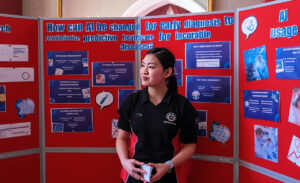
HIGHER PROJECT QUALIFICATION (HPQ)
HIGHER PROJECT QUALIFICATION (HPQ)
The Higher Project Qualification (HPQ) allows students to discover the joys of independent learning, take responsibility for their own study and develop new life and study skills. It enables students to embark on a largely self-directed project, to study an aspect of one of their courses in greater depth, or to choose a wider topic which is of interest, possibly something which might be useful for the future.
The HPQ provides the opportunity for students to learn how to conduct effective research, deal with data, review literature, how to construct a piece of academic writing including referencing, ethics and professional codes of practice in research, analysis and presentation of data, how to evaluate sources, ICT and presentation skills, and how to become a reflective learner. Students will work with a supervisor over the course of a year to guide them at each stage of the project, and will attend taught sessions on aspects of the course.
Course details
Students will complete their project over the course of Year 10. The responsibility for managing the project lies with the student, but they will attend weekly taught sessions and regular supervisor meetings will be held to guide the students throughout the year.
Assessment details
Students may decide to produce either:
A 2,000 word research-based written report.
A performance (e.g. dance/drama/music) or a community/charity project. This will require a shorter 500 word report alongside.
An artefact (piece of art/product, business venture, computer software). This will require a shorter 500 word report alongside.
The process and end product are both assessed via a production log (diary of progress), and students present their finished product to a small audience, as part of the assessment process.
The HPQ is internally assessed by supervisors and the centre co-ordinator, and externally moderated. The qualification is graded A*-C*.
This qualification is offered to students alongside their GCSE programme of study, in addition to their option choices.
*The grade achieved does not count towards GCSE points score. The value of the qualification lies in the skills developed by the students.
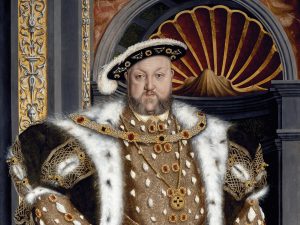
HISTORY
HISTORY
AQA: 8145
To understand the world today, we need an appreciation of the world yesterday. Studying History allows our students a better understanding of politics, economics, religion, and the skills to negotiate current affairs in the age of 24 hour news and fake news.
The most profound thing about History is that it is inescapable. To be an Historian is to be a rounded individual who has developed an understanding of both past and present. History develops knowledge, of course, but also skills and concepts that are essential to a student’s growth. Our chosen syllabus and scheme of work allows our students to widen their skills by encouraging the assessment, analysis and interpretation of information.
These analytical skills, as well as the necessity to write clearly and concisely, are attributes relevant to so many careers. Through studying History at GCSE, our students are given the tools to ask the right questions, express their own opinions and to look beyond the headlines.
Paper 1: Understanding the modern world
Section A: Period Study
AB – Germany 1890 – 1945 – Democracy and Dictatorship
This period focuses on the rise of the Nazi Party and Hitler’s dictatorship. The period sees the rise of German democracy post World War One, but sees it collapse as the Depression takes hold and extreme Parties, who aimed to destroy democracy, were elected. Students will study the political, economic and social factors that led to this change, as well as the role of key individuals who shaped Nazi Germany.
Section B
BC – Conflict and tension between East and West 1945 – 1972
This wider world depth study enables students to understand the dramatic and tense years of the Cold War. It focuses on the origins of this Superpower struggle, emerging in the closing year of the Second World War and assesses how the conflict evolved to the Cuban Missile Crisis, where the world almost sunk to Nuclear War. Students will have the chance to study why tensions grew and how politics, subterfuge, technological developments and individuals shaped the nature of international relations.
Part one: The Origins of the Cold War
Part two: The Development of the Cold War, 1949—1960
Part three: Transformation of the Cold War
Paper 2: Shaping the Nation Section A
Thematic Study
2A Britain: Health and people c1000 to present day
This thematic study will enable students to gain an understanding of how medicine and public health developed in Britain since the Medieval era. It considers the causes, nature and consequences of short and long term developments and their impact on British society. Students will have the opportunity to study changing ideas and why medicine, surgery and public health improved, with focus on pandemics such as the Bubonic Plague and developments and attitudes towards vaccination. Students will study the importance of the following factors:
- war
- superstition and religion
- chance
- government
- communication
- science and technology
Section B:
British depth study including the historic environment
Elizabethan England, c1568 – 1603
This option allows students to study in depth a specified period, the last 35 years of Elizabeth I’s reign. The study will focus on major events of Elizabeth I’s reign considered from economic, religious, political, social and cultural standpoints, and arising contemporary and historical controversies.
Part one: Elizabeth’s court and Parliament
Part two: Life in Elizabethan times
Part three: Troubles at home and abroad
Part four: historic environment study. A study of one site, which changes each year.
Assessment
Paper 1: Understanding the Modern World
Written Exam: 1 hour 45 minutes – 50% of GCSE Section A – six compulsory questions (40 marks) Section B – four compulsory questions (40 marks)
Plus four marks for spelling, punctuation and grammar
Paper 2 : Shaping the Nation
Written Exam: 1 hour 45 minutes – 50% of GCSE Section A – four compulsory questions (40 marks) Section B – four compulsory questions (40 marks)
Plus four marks for spelling, punctuation and grammar.
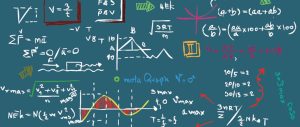
MATHEMATICS
MATHEMATICS (CORE)
Edexcel: 1MA1
The specification is designed to develop confidence and competence in the use of mathematics and to develop an ability to think and reason mathematically. It encourages students to understand the importance of precision and rigour and the ever-increasing emphasis on application of mathematics in the real world.
The course is structured in such a way that previous work will be revised and revisited to ensure full understanding, whilst new work will be introduced throughout the course.
Opportunity will be given to all pupils to reach the best GCSE grade within their capability. They should emerge from GCSE Mathematics with a level of confidence and fluency that will provide a firm foundation for the rest of their learning and working lives. Students who intend to go on to A Level Mathematics or Further Mathematics will be able to progress with confidence and competence.
There are two tiers of entry:
Higher (Grades 4-9)
Foundation (Grades 1-5)
The scheme of assessment comprises three separate papers as detailed below.
Paper 1 – Written Paper (Non-Calculator)
Paper 2 – Written Paper (Calculator)
Paper 3 – Written Paper (Calculator)
Each paper is worth 33.3% of the GCSE mathematics assessment. All three papers are assessed over 1 hour and 30 minutes and each is worth 80 marks. Candidates must sit all three papers at the same tier.
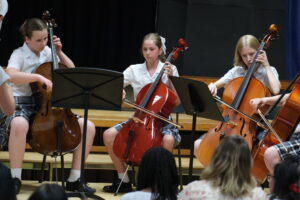
MUSIC
MUSIC
AQA: 8271
Music is constantly evolving, inspiring creativity and expression in a way that no other subject can. GCSE Music provides a contemporary, accessible and creative education in music that will motivate and stretch students of all abilities, equipping them with the skills and experience to succeed at GCSE and go on to further study. GCSE music brings theory, listening and composition to life in new and engaging ways. The course develops students’ abilities in the three main strands of Performing, Composing and Analysis of Music and allows for different learning styles and musical tastes. GCSE music is a challenging but rewarding course.
Component 1: Understanding Music
This component is worth 40% of the total GCSE mark. There are four areas of study:
- Western classical tradition 1650 – 1910
- Popular music
- Traditional music
- Western classical tradition since 1910
The areas of study provide an appropriate focus for students to appraise, develop and demonstrate an in-depth knowledge and understanding of musical elements, musical context and musical language.
Students must be able to listen attentively to unfamiliar music from all four areas of study to identify and accurately describe musical elements, musical contexts and use musical language (including staff notation).
Students will study two of the Areas of Study (one of which must be AoS1) in greater detail through looking at a notated score. The compulsory set work for AoS1 is 1st Movement of Beethoven Symphony No 1.
Assessment is through a 1 hour and 30 minutes written exam that includes both listening and study pieces sections.
Component 2: Performing Music
This component is worth 30 % of the total GCSE mark.
Students must offer two performances of Grade 5 standard (minimum) that are recorded, internally assessed and externally moderated. One performance must be as a soloist and one piece must be as part of an ensemble lasting a combined minimum of four minutes. The performance as part of an ensemble must last for a minimum of one minute.
Repertoire will be chosen by the student and teacher. It can be in any chosen style or genre.
Component 3: Composing Music
This component is worth 30 % of the total GCSE mark.
Students must learn how to develop musical ideas, including extending and manipulating musical phrases in order to compose pieces that are musically convincing through two compositions. One must be in response to an externally set brief (Composition 1) and the other a free composition (Composition 2).
The combined duration of the compositions must be a minimum of three minutes. Compositions can be composed in any style or genre to best reflect the skills, strengths and interests of the individual students. The two compositions that are presented will be internally assessed and externally moderated.
In order to be successful in the GCSE Music course it is essential that by the beginning of Year 10 students are performing at a minimum of Grade 4 standard on either an instrument or voice and are attending theory classes working at a minimum of Grade 3 music theory standard.

ONE-YEAR GCSE COURSE FOR INTERNATIONAL STUDENTS
A bespoke one-year GCSE programme designed to support students joining from overseas in making a smooth transition into the British education system.
This course is available to termly boarders only:
Boarding at Thornton is an inclusive and welcoming environment, where students live alongside boarders from a diverse range of backgrounds. Our multi-cultural community offers a truly immersive experience, where international students benefit from meaningful interactions with British peers and others from around the world.
5 GCSEs:
- English Language
- Maths
- Combined Science
- Religion and Philosophy
Alongside:
- ESOL
- PSHEE
- Games

PHOTOGRAPHY
PHOTOGRAPHY
EDEXCEL: 1PYO
This course follows the same assessment criteria and coursework format as Art, Craft & Design.
Students will be introduced to, and gain knowledge of both digital and film based still photography. This will entail various photographic techniques and understanding of how to maximise the settings of compact, SLR and DSLR cameras. Students will experience using a 35mm film camera, and gain a theoretical and practical understanding of the film development process. Students also explore a wide variety of artists for inspiration.
The Photography course is designed:
- To promote working independently and increasing skills using a wide range of media confidently and creatively
- To learn how to operate a compact and a DSLR
- camera including different settings
- To explore and study a variety of photographers relevant to the topic
- To capture images inspired by artists/ photographers using different camera settings and techniques
- To refine students’ ideas using a range of resources, media and mark-making, and image manipulation on Adobe Photoshop
- To experience and understand the differences between film and digital photography
- To enhance students’ recording skills through graphic communication from both collected sources and direct observation including visits to galleries
- To be able to capture light and composition and use photography rules appropriately and correctly
- To establish good practice in the selection and presentation of the students’ art portfolio/prep sheets/sketchbook, ensuring all relevant artist research, contexts, sources, and other elements are appropriately referenced in their words
At Thornton we have a broad selection of specialist photographic equipment meaning we are able to cover many disciplines to an extremely high level.
Students have access to 18 different cameras ranging from a spring loaded fully manual camera made in 1939 (Kodak Retinette), through to modern state of the art DSLRs (Canon 6D).
The majority of student exploration falls within one of the following three categories:
Digital photography: We explore digital photography in great depth, learning how to fully control digital cameras and gain an understanding of the hidden capabilities of modern photographic equipment. We also learn how to get the best out of our photographs using Photoshop and other photo-editing software.
As well as producing photographs, the students explore the theory and science of how a photograph is captured and displayed (on screen and print).
Film Photography: Film photography is currently experiencing a resurgence in popularity. Teaching the discipline encourages students to hone their skills and appreciate the origin of many photographic settings and techniques. Students gain practical experience of the ‘wet- printing’ processes, including developing their own film, and printing photographs and photograms using various darkroom processes.
Printing methods: Photography does not end once the shutter is pressed. Students explore various ways of evolving work using traditional contact printing techniques and methods, as well as more modern experimental transfer techniques.
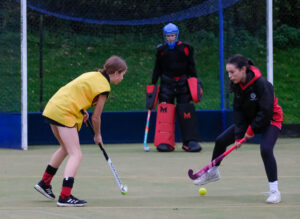
PHYSICAL EDUCATION (CORE)
PHYSICAL EDUCATION (CORE)
Students entering Year 10 will already have followed the National Curriculum in Games, Athletics, Gymnastics, Dance and Swimming and should have a good grounding in all of the basic physical skills.
On entering Year 10, we like to give the students the opportunity to broaden their experience of physical activity. Whilst still continuing with the traditional sports through both years, more emphasis will be placed on an Activity Programme. This takes the form of half-termly units from a selection of activities such as Badminton, Table Tennis, Volleyball, Basketball, Football, Trampolining, Ultimate Frisbee, Aerobics, Fitness and Golf.
This widening of the Physical Education programme is always much appreciated by the senior students, but the extent and variety of choices offered each year is dependent entirely on timetabling and group size. Students also follow our leadership programme throughout Years 10 and 11 where they can gain an officially recognised Sports Leaders qualification.
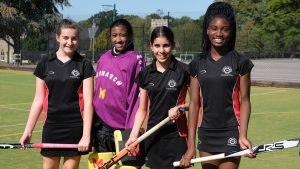
PHYSICAL EDUCATION (GCSE)
PHYSICAL EDUCATION (GCSE)
AQA
If you want to follow this course you will need to:
- Enjoy PE
- Be able to commit to lunch time clubs to enhance your practical skills
- Have lots of experience of playing/performing in at least three different Sports.
The course is 60% Theory and 40% Practical
Subject Content
- Applied anatomy and physiology Movement analysis
- Physical training Use of data Sports Psychology
- Socio-cultural influences Health, fitness and well-being
Assessments
Paper 1: The human body and movement in physical activity and sport
What is assessed?
- Applied anatomy and physiology Movement analysis
- Physical training
- Use of data
How it is assessed
Written exam: 1 hour 15 minutes
78 marks
30% of GCSE
Paper 2: Socio-cultural influences and well-being in physical activity and sport
What is assessed?
- Sports psychology
- Socio-cultural influences Health, fitness and well-being Use of data
How it is assessed
Written exam: 1 hour 15 minutes
78 marks
30% of GCSE
Non-exam assessment: Practical performance in physical activity and sport
What is assessed?
Practical performance in three different physical activities in the role of player/performer (one in a team activity, one in an individual activity and a third in either a team or in an individual activity). Analysis and evaluation of performance to bring about improvement in one activity.
How it is assessed
Assessed by teachers Moderated by AQA 100 marks
40% of GCSE
Further information
For each of their three activities, students will be assessed in skills in progressive drills (10 marks per activity) and in the full context (15 marks per activity).
Students will be assessed on their analysis (15 marks) and evaluation (10 marks) of performance to bring about improvement in one activity.
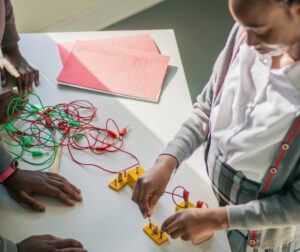
PHYSICS
PHYSICS
AQA: 8463
Specification:
The qualification is linear, so that the girls will sit all their exams at the end of the course.
Subject content
- Forces
- Energy
- Waves
- Electricity
- Magnetism and electromagnetism
- Particle model of matter
- Atomic structure
- Space Physics
Assessments
There are two Physics papers, comprising of Multi- choice, short answer and long response questions. Each paper is 1hour 45minutes and the first paper will assess the content in sections 1-4, and the second will assess the content in sections 5-8.

PSYCHOLOGY
PSYCHOLOGY
AQA: 8182
What is Psychology?
Most people when they hear the word ‘psychology’ think of mental disorders and crazy abnormal behaviour. BUT – psychologists are not just interested in such behavioural extremes; many are interested in investigating very ordinary, everyday behaviour such as memory, aggression, thinking, obeying others and sleeping, to name just a few research areas.
So, psychology is ‘the scientific study of human behaviour and experience’.
It aims to describe and explain behaviour which, in turn, allows us to predict and modify behaviour.
What does the course cover?
In the first year of the course, the following topics are studied:
Perception
Including monocular and binocular depth cues, visual illusions and constancies, theories of perception and sensation, and the effects of motivation, expectation, emotion and culture on perceptual set.
Development
Including early brain development, theories of cognitive and social development, how learning affects development, and the importance of mindset for development.
Memory
In this introduction to cognitive psychology, students will learn the structure and processes of memory and information processing, active processes of memory, and the factors affecting accuracy of memory.
Research methods
This topic enables students to form a clear understanding of the scientific research procedures involved in psychological research (design, procedure, analysis of results, evaluation) within the context of the core topic areas.
In the second year of the course, the following topics are studied:
Social influence
Students will learn about factors affecting conformity, obedience, and bystander behaviour; crowd behaviour, and ways to prevent blind obedience.
Language, thought and communication
Including the relationship between language and thought, differences between human and animal communication, non-verbal communication and explanations for non-verbal behaviour.
Psychological problems (mental health issues)
Students will learn about symptoms and diagnosis of depression and addiction, genetic explanations, cognitive theory and learning theory explanations, treatment including drug therapy and cognitive behavioural therapy, and issues and debates surrounding nature and nurture.
Neuropsychology
Including the structure and function of the brain, hemispheric lateralisation, the role of the central nervous system, the emergence of cognitive neuroscience, and the impact of neurological damage on behaviour.
How is the course assessed?
Paper 1 (Cognition and Behaviour)
1hour 45minutes
100 marks – 50% of total GCSE
Four sections with a combination of multiple choice, short answer and extended answer questions covering:
1: Memory
2: Perception
3: Development
4: Research Methods
Paper 2 (Social Context and Behaviour)
1hour 45minutes
100 marks – 50% of total GCSE
Four sections with a combination of multiple choice, short answer and extended answer questions covering:
1: Social Influence
2: Language, Thought and Communication 3: The Brain and Neuropsychology
4: Psychological Problems
Students must demonstrate the following assessment objectives within their writing:
AO1 Demonstrate knowledge and understanding of psychological ideas, processes and procedures.
AO2 Apply knowledge and understanding of psychological ideas, processes and procedures.
AO3 Analyse and evaluate psychological information, ideas, processes and procedures to make judgements and draw conclusions.
What skills will be developed through the course?
Students will learn skills of critical reading and writing, argument and counter argument, the ability to be analytical, an awareness of the assumptions of different approaches and perspectives in psychology and how they impact on the conclusions drawn.
Where can Psychology lead in the future?
The great thing about psychology is that it doesn’t close any doors. It is the first step into a career as a chartered psychologist in a field such as clinical, neuroscience, forensic, occupational, sports, or environmental psychology, as well as teaching or research.
Psychology is a highly regarded qualification by higher education institutions and employers alike; especially in fields that are ‘people-oriented’ – such as law, marketing, HR, policing, teaching, PR, nursing, counselling… the list goes on!

RELIGIOUS STUDIES (CORE)
RELIGIOUS STUDIES (CORE)
AQA: 8063
As a Roman Catholic School, we are obliged to follow the guidance of The Bishops’ Conference with regard to our courses for the new RS Syllabus.
The aims and objectives of this qualification are to enable students to:
- develop knowledge and understanding of religions and non-religious beliefs, such as atheism and humanism
- develop knowledge and understanding of religious beliefs, teachings, and sources of wisdom and authority, including through their reading of key religious texts, other texts, and scriptures of the religions they are studying
- develop ability to construct well-argued, well- informed, balanced and structured written arguments, demonstrating their depth and breadth of understanding of the subject
- engage with questions of belief, value, meaning, purpose, truth, and their influence on human life
- reflect on and develop their own values, beliefs and attitudes in the light of what they have learnt and contribute to their preparation for adult life in a pluralistic society and global community
- demonstrate knowledge and understanding of two religions
- demonstrate knowledge and understanding of key sources of wisdom and authority including scripture and/or sacred texts, where appropriate, which support contemporary religious faith
- understand the influence of religion on individuals, communities and societies
- understand significant common and divergent views between and/or within religions and beliefs
- apply knowledge and understanding in order to analyse questions related to religious beliefs and values
- construct well-informed and balanced arguments on matters concerned with religious beliefs and values
Subject content
Content and assessment overview
The AQA qualification in Religious Studies Syllabus B consists of two externally examined papers.
All students must complete:
Paper 1: Component 1 – Study of Religion (Catholic Christianity, Christianity and Islam)
Paper 2: Component 2 – Perspectives on Faith
Section A: Study of Second Religion (Catholic Christianity, Christianity, Islam, Buddhism, Hinduism, Judaism and Sikhism)
Section B: Themes – (i) Religion, Relationships and Family and (ii) Religion, Peace and Conflict
Paper 1: Component 1 Catholic Christianity
Written examination: 1 hour 45 minutes
50% of the qualification 96 marks plus 5 SPAG
Content overview
Students must study Catholic beliefs, teachings, practices, sources of authority and forms of expression in relation to six topics:
- Creation
- Incarnation
- The Triune God
- Redemption
- Church
- Eschatology
Assessment overview
- Questions will be set on any four of the topics listed in the overview
- Students must answer all set questions
- Each topic is marked out of 24 marks
- There will be one five-part question per topic of 1,2,4,5 and 12 marks
- The 12 mark section will require extended writing and will test analysis and evaluation
Paper 2: Component 2 Perspectives on Faith
SECTION A: Judaism (There will be two five-part questions)
SECTION B: Themes (There will be two five-part questions, one on each theme)
Written examination: 1 hour 45 minutes
50% of the qualification, 96 marks and 5 SPAG
Assessment overview
- Each five-part question is marked out of 24 marks
- Each group of five questions will follow the same structure of 1,2,4,5 and 12 marks
- The 12 mark question will require extended writing and will test analysis and evaluation
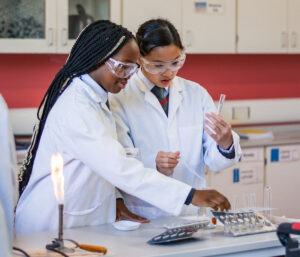
SCIENCE – GCSE COMBINED SCIENCE Trilogy (2 GCSE)
SCIENCE – GCSE COMBINED SCIENCE Trilogy (2 GCSE)
AQA: 8464
Specification:
The qualification is linear, so that the girls will sit all their exams at the end of the course.
Subject content
Biology
- Cell Biology
- Organisation
- Infection and response
- Bioenergetics
- Homeostasis and response
- Inheritance, variation and evolution
- Ecology
Chemistry
- Atomic structure and the periodic table
- Bonding, structure, and the properties of matter
- Quantitative Chemistry
- Chemical changes
- Energy changes
- The rate and extent of chemical change
- Organic Chemistry
- Chemical analysis
- Chemistry of the atmosphere
- Using resources
Physics
- Forces
- Energy
- Waves
- Electricity
- Magnetism and electromagnetism
- Particle model of matter
- Atomic structure
Assessments
There are six papers: two Biology, two Chemistry and two Physics.
Each paper is 1hr 15min and will assess half of the subject matter in each science discipline.
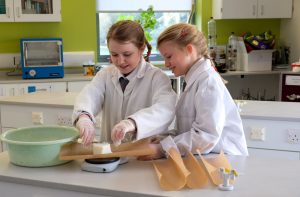
SCIENCE OPTIONS (CORE)
SCIENCE OPTIONS (CORE)
- The best Science learning takes place when students are actively engaged in their learning
- The best Science learning takes place when experimentation is at the heart of learning
- The best Science learning takes place when enthusiastic teachers, passionate and knowledgeable about their subject, bring this passion, knowledge and enthusiasm into the classroom and share it with their students
- The best Science learning takes place when students realise that their teacher cares about them as individuals and cares about their individual progress rather than lumping students together as groups
- At Thornton our new GCSE courses will be written so that this best learning is at its heart
There will be a number of possible routes that the girls will be able to take in their science education at Thornton. Girls can choose to do:
A: The 2 GCSE pathway. We will be following the AQA Trilogy course (8464). This is the default position for all students.
B: The 3 Separate Science AQA GCSE pathway (8461, 8462 and 8463) GCSE in Chemistry, Biology and Physics will be taken. This will be the pathway of choice for students who are considering doing at least two Sciences beyond GCSE or for those who have a natural interest in Science and want to go into more depth than the Trilogy course.
Option Booklet guidance
In the option booklet if students wish to do:
- The Trilogy Combined Science then IGNORE the separate science option in Block A and choose something else from this block
- The 3 Separate Science GCSE subjects (Physics, Chemistry and Biology) then students MUST select the Separate Science option from Block A and nothing else from this option
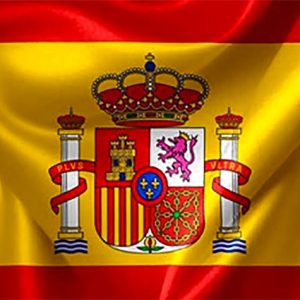
SPANISH
SPANISH
Edexcel: 2SP01
Why study Modern Languages?
- Languages broaden horizons and open up a whole new world of possibilities and opportunities
- There are over 5000 degree courses in the UK which involve the study of languages. Students can study languages combined with hundreds of other subjects such as Law, Economics, Engineering, History, Finance, Media, Broadcasting, Biology, etc
- Learning languages helps an individual to become a more confident communicator
- Experimenting with new words and phrases is both fun and challenging
Whether or not a student intends to specialise in this area, knowledge of one or more languages:
- Enhances job prospects – almost all jobs can be enhanced by the ability to speak a different language
- Helps university application – universities are looking for students with a wide range of transferable skills
- Makes it possible to study abroad in a non-English speaking country without the exorbitant university fees – students can study Psychology in Spain!
- More and more universities also offer a year abroad as part of non-language degrees
- Helps if a student plans to travel the world either in a gap year or later
If a student speaks a language at home which is not taught as part of our curriculum, we will try to make it possible for her to take exams in the language here if she so wishes.
How is the GCSE courses in Spanish organised?
- Identity and Culture
- Me, my family and friends
- Relationships and family activities
- Friendships and social groups
- Youth culture, leisure activities and use of technology
- Typical lifestyles, daily routines and activities, food and holidays
- Local, national, international and global areas of interest
- Festivals, traditions, memorable events, sporting events
- Charity related activities, fair trade, food miles, global poverty, fundraising
- Key features and activities of a town or region
- Current and future study and employment
- School subjects
- School life
- Future plans
Students have already studied aspects of these in their language lessons. They will continue to use a course book and will have some lessons in the computer room using exciting software.
How is it assessed?
There is no coursework; all of the exams are at the end of the two-year period. Speaking exams will be conducted by the teacher towards the end of the course, and then be sent away for marking.


